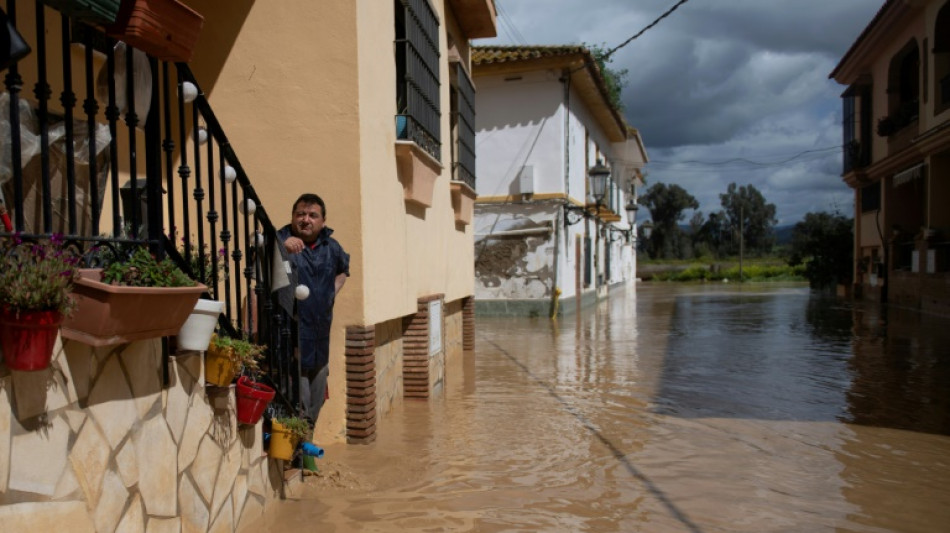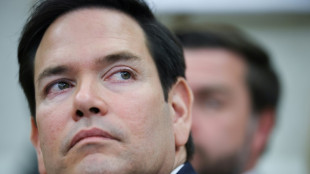
-
 Zuckerberg denies Meta bought rivals to conquer them
Zuckerberg denies Meta bought rivals to conquer them
-
Starc stars as Delhi beat Rajasthan in Super Over

-
 Weinstein asks to sleep in hospital, citing prison 'mistreatment'
Weinstein asks to sleep in hospital, citing prison 'mistreatment'
-
Amorim asks McIlroy to bring Masters magic to Man Utd

-
 Ruud keeps Barcelona Open defence on course
Ruud keeps Barcelona Open defence on course
-
Trump tariffs could put US Fed in a bind, Powell warns

-
 CONCACAF chief rejects 64-team World Cup plan for 2030
CONCACAF chief rejects 64-team World Cup plan for 2030
-
Putin praises Musk, compares him to Soviet space hero

-
 Son to miss Spurs' Europa League trip to Frankfurt
Son to miss Spurs' Europa League trip to Frankfurt
-
US senator in El Salvador seeking release of wrongly deported migrant

-
 Trump tariffs could put the US Fed in a bind, Powell warns
Trump tariffs could put the US Fed in a bind, Powell warns
-
US judge says 'probable cause' to hold Trump admin in contempt

-
 India opposition slams graft charges against Gandhis
India opposition slams graft charges against Gandhis
-
Nate Bargatze to host Emmys: organizers

-
 US Fed Chair warns of 'tension' between employment, inflation goals
US Fed Chair warns of 'tension' between employment, inflation goals
-
Trump touts trade talks, China calls out tariff 'blackmail'

-
 US judge says 'probable cause' to hold govt in contempt over deportations
US judge says 'probable cause' to hold govt in contempt over deportations
-
US eliminates unit countering foreign disinformation

-
 Germany sees 'worrying' record dry spell in early 2025
Germany sees 'worrying' record dry spell in early 2025
-
Israel says 30 percent of Gaza turned into buffer zone

-
 TikTok tests letting users add informative 'Footnotes'
TikTok tests letting users add informative 'Footnotes'
-
Global uncertainty will 'certainly' hit growth: World Bank president

-
 EU lists seven 'safe' countries of origin, tightening asylum rules
EU lists seven 'safe' countries of origin, tightening asylum rules
-
Chelsea fans must 'trust' the process despite blip, says Maresca

-
 Rebel rival government in Sudan 'not the answer': UK
Rebel rival government in Sudan 'not the answer': UK
-
Prague zoo breeds near-extinct Brazilian mergansers

-
 Macron to meet Rubio, Witkoff amid transatlantic tensions
Macron to meet Rubio, Witkoff amid transatlantic tensions
-
WTO chief says 'very concerned' as tariffs cut into global trade

-
 Sports bodies have 'no excuses' on trans rules after court ruling: campaigners
Sports bodies have 'no excuses' on trans rules after court ruling: campaigners
-
Zverev joins Shelton in Munich ATP quarters

-
 The Trump adviser who wants to rewrite the global financial system
The Trump adviser who wants to rewrite the global financial system
-
US senator travels to El Salvador over wrongly deported migrant

-
 UN watchdog chief says Iran 'not far' from nuclear bomb
UN watchdog chief says Iran 'not far' from nuclear bomb
-
Trump says 'joke' Harvard should be stripped of funds

-
 Macron vows punishment for French prison attackers
Macron vows punishment for French prison attackers
-
Canada central bank holds interest rate steady amid tariffs chaos

-
 Rubio headed to Paris for Ukraine war talks
Rubio headed to Paris for Ukraine war talks
-
Australian PM vows not to bow to Trump on national interest

-
 New attacks target France prison guard cars, home
New attacks target France prison guard cars, home
-
Global trade uncertainty could have 'severe negative consequences': WTO chief

-
 Google facing £5 bn UK lawsuit over ad searches: firms
Google facing £5 bn UK lawsuit over ad searches: firms
-
Onana to return in goal for Man Utd against Lyon: Amorim

-
 Tiktok bans user behind Gisele Pelicot 'starter kit' meme
Tiktok bans user behind Gisele Pelicot 'starter kit' meme
-
'Put it on': Dutch drive for bike helmets

-
 China's Xi meets Malaysian leaders, vows to 'safeguard' Asia allies
China's Xi meets Malaysian leaders, vows to 'safeguard' Asia allies
-
France urges release of jailed Russian journalists who covered Navalny

-
 Gabon striker Boupendza dies after 11th floor fall
Gabon striker Boupendza dies after 11th floor fall
-
UK top court rules definition of 'woman' based on sex at birth

-
 PSG keep Champions League bid alive, despite old ghosts reappearing
PSG keep Champions League bid alive, despite old ghosts reappearing
-
Stocks retreat as US hits Nvidia chip export to China


Global temperatures at near historic highs in March: EU monitor
Global temperatures hovered at historic highs in March, Europe's climate monitor said on Tuesday, prolonging an extraordinary heat streak that has tested scientific expectations.
In Europe, it was the hottest March ever recorded by a significant margin, said the Copernicus Climate Change Service, driving rainfall extremes across a continent warming faster than any other.
The world meanwhile saw the second-hottest March in the Copernicus dataset, sustaining a near-unbroken spell of record or near-record-breaking temperatures that has persisted since July 2023.
Since then, virtually every month has been at least 1.5 degrees Celsius (2.7 degrees Fahrenheit) hotter than it was before the industrial revolution when humanity began burning massive amounts of coal, oil and gas.
March was 1.6C (2.9F) above pre-industrial times, prolonging an anomaly so extreme that scientists are still trying to fully explain it.
"That we're still at 1.6C above preindustrial is indeed remarkable," said Friederike Otto of the Grantham Institute for Climate Change and the Environment at Imperial College London.
"We're very firmly in the grip of human-caused climate change," she told AFP.
- Contrasting extremes -
Scientists warn that every fraction of a degree of global warming increases the intensity and frequency of extreme weather events such as heatwaves, heavy rainfall and droughts.
Climate change is not just about rising temperatures but the knock-on effect of all that extra heat being trapped in the atmosphere and seas by greenhouse gases like carbon dioxide and methane.
Warmer seas mean higher evaporation and greater moisture in the atmosphere, causing heavier deluges and feeding energy into cyclones, but also affecting global rainfall patterns.
March in Europe was 0.26C (0.47F) above the previous hottest record for the month set in 2014, Copernicus said.
It was also "a month with contrasting rainfall extremes" across the continent, said Samantha Burgess of the European Centre for Medium-Range Weather Forecasts, which runs the Copernicus climate monitor.
Some parts of Europe experienced their "driest March on record and others their wettest" for about half a century, Burgess said.
Elsewhere in March, scientists said that climate change intensified an extreme heatwave across Central Asia and fuelled conditions for extreme rainfall which killed 16 people in Argentina.
- Persistent heat -
The spectacular surge in global heat pushed 2023 and then 2024 to become the hottest years on record.
Last year was also the first full calendar year to exceed 1.5C: the safer warming limit agreed by most nations under the Paris climate accord.
This represented a temporary, not permanent breach, of this longer-term target, but scientists have warned that the goal of keeping temperatures below that threshold is slipping further out of reach.
Scientists had expected that the extraordinary heat spell would subside after a warming El Nino event peaked in early 2024, and conditions gradually shifted to a cooling La Nina phase.
But global temperatures have remained stubbornly high, sparking debate among scientists about what other factors could be driving warming to the top end of expectations.
The European Union monitor uses billions of measurements from satellites, ships, aircraft and weather stations to aid its climate calculations.
Its records go back to 1940, but other sources of climate data -- such as ice cores, tree rings and coral skeletons -- allow scientists to expand their conclusions using evidence from much further in the past.
Scientists say the current period is likely the warmest the Earth has been for the last 125,000 years.
G.Haefliger--VB


